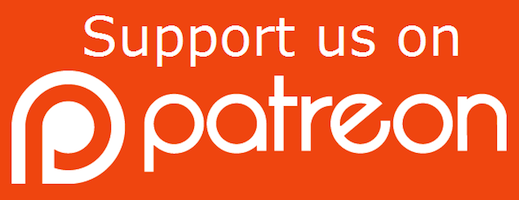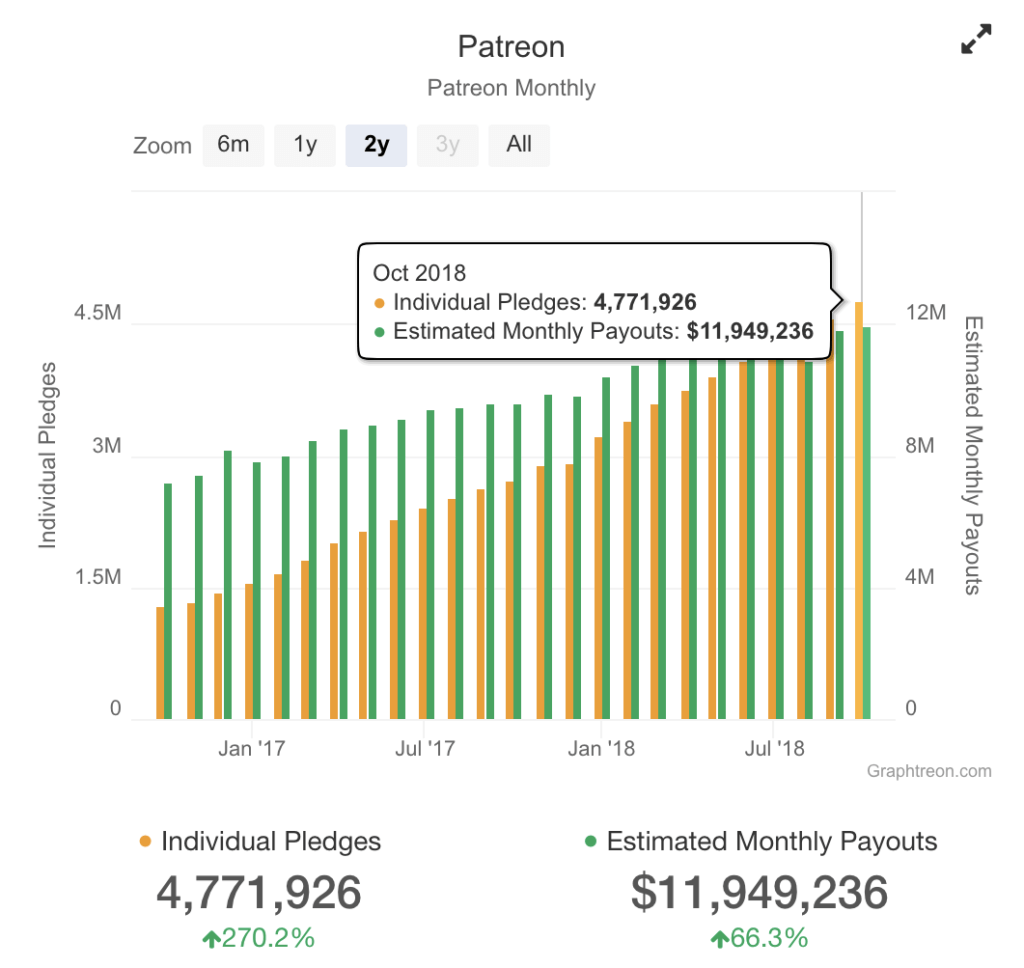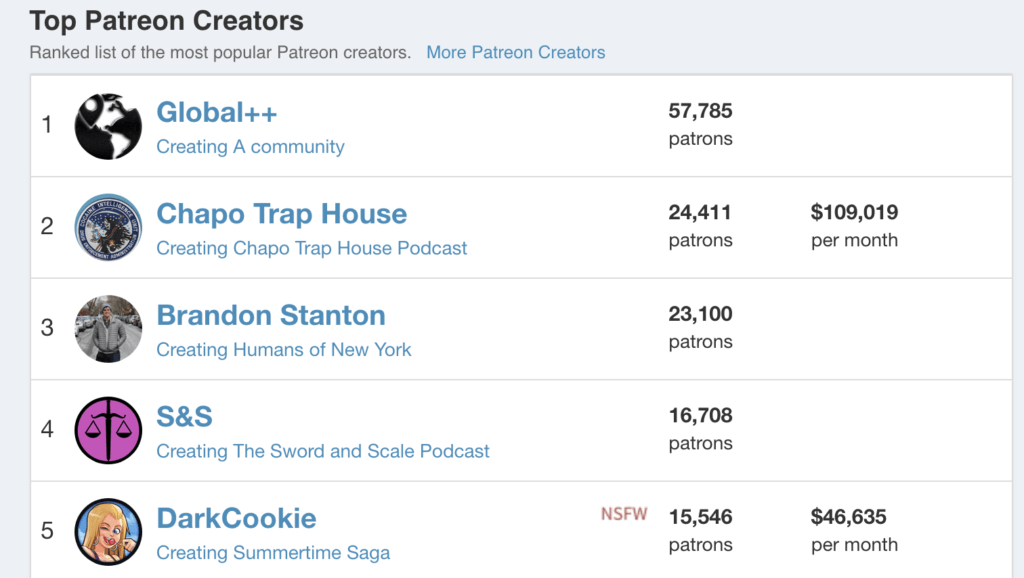The Death of the Starving Artist: Patronage via Patreon

Subscription-based crowdfunding platforms like Patreon claim to help artists to make a fair living through fan support – but is that truly the case?
“[I felt] like there was such a discrepancy between what creative people are worth and the financial engine of the web that is paying them.” – Jack Conte, Patreon founder [1]
On July 2016, N.K Jemisin quit her day job and became a full-time author. Prior to quitting her day job, N.K. had published six novels, which had been nominated for prestigious genre awards and landed on the New York Times Notable List. Despite this, Jemisin worked from 9-7, largely because “writing income is inherently unstable.” Seeking more time to write, she decided to try fundraising her income through the web platform Patreon, asking fans to donate $5/month so that she could spend more time on her novels. As of November 2018, Jemisin has 1500+ patrons providing her with $6000+ in monthly income. [2]
Patreon was founded in 2013 by musician Jack Conte, and today has more than 2 million active patrons servicing more than 100,000 creators [3]. Instead of asking for money for a one-time specific project, like Kickstarter or Gofundme, Patreon mimics a patronage system where subscribers can provide ongoing support for creators they love. In turn, creators provide exclusive content to patrons, typically offered in tiers: $1/month might give you access to works-in-process, while $25/month leads to a personal thank-you note.
Over the last two years, the number of individual pledges on Patreon has grown by 270%. Source: Graphtreon (https://graphtreon.com/patreon-stats)
Disrupting how creators make money comes with challenges, however. Patreon claims it provides creators with stability – an effective replacement for salary. However, a 2018 Graphtreon study shows that only 1,393 of creators on the platform (<2%) actually earn the 2017 minimum wage of $1,160 a month. The Patreon model works best for those who already have an established fanbase [4, 5]. Patreon’s discovery tools are not robust, so there is currently no meaningful way to build a following on the platform. This has led to some content creators arguing the Patreon isn’t actually an ideal solution to helping creators stabilize income–it’s simply a fancy payment processing platform that supports already-successful artists. [6]
Top Creators on Patreon as of November 12, 2018. Source: Graphtreon (https://graphtreon.com/)
The disconnect between Patreon and the majority of its users became obvious in December 2017 when Patreon announced a change to its fee structure. The change disproportionately affected users making $1 pledges, which caused massive backlash, with subscribers leaving the platform en masse. Patreon quickly backtracked and decided not to rollout the new fee structure, but trust between users and the platform was severely eroded. [7] Several creators moved to Drip, a competing platform owned by Kickstarter, which was launched in the wake of Patreon’s failure to listen to its users.
To counteract some of the challenges posed by their business model, Patreon has taken two bold steps. The first is several acquisitions, with the goal of creating what some outlets have called a “Patronage Empire.” [8] Among their acquisitions is competitor Memberful, which Patreon purchased as a way to add “a self-service white label membership solution to our growing product portfolio.” [9] Although Memberful will remain independently operated, its acquisition indicates that consolidation in this space may be imminent. This highlights how important it is for Patreon and similar “crowdsourced” payment platforms to find fair ways of providing for their creators, who remain “at the mercy of the platform.” [10]
Patreon also launched a Creator App Directory and Developer Portal in 2017, which takes its “open innovation” on the platform to a whole new level. By publishing their API, Patreon is allowing third-party developers to create tools that support “patron-only experiences around the web” – effectively extending Patreon’s reach beyond their own website into other sites like WordPress or Discourse. Additional integrations include Slack and Reddit, with more apps surely to come. [11, 12] This action is likely to reap dividends in the long run as more independent developers create tools for the platform…without being on Patreon’s payroll.
In looking to the future, I would recommend that Patreon invest some of its resources into making the platform more robust for creators, specifically in how they deliver content to users, and how they can potentially build their fan bases. If Patreon’s goal is truly to define “what it means to be a member of something in a digital world” [1], then allowing the rewards of that membership to be more easily reaped by a greater amount of people is crucial. Patreon appears to have outsourced this element of their platform to third-party apps, allowing “consumption and discovery” to occur elsewhere. This isn’t a bad strategy, however they should closely monitor the most successful platforms so that they can avoid costly acquisitions in the future. Adding more value through the Patreon community will also shield them from being simply a payment processor, which is not a sustainable value proposition.
To the readers of this article, I’d like to pose the following question: in what situations are you willing to pay for content? If you think content should be free, how can we best support the people that create it – are there business models that you think we haven’t explored yet? (798 words)
Sources:
[1] Ben Thompson, “Patreon Acquires Memberful, An Interview with Patreon CEO Jack Conte and Memberful CEO Drew Strojny,” Stratechery by Ben Thompson, August 8, 2018, [https://stratechery.com/2018/patreon-acquires-memberful-an-interview-with-patreon-ceo-jack-conte-and-memberful-ceo-drew-strojny], accessed November 2018.
[2] Nora Jemisin, “N.K. Jemisin is creating Fiction,” [https://www.patreon.com/nkjemisin], accessed November 2018.
[3] Patreon, “About,” [https://www.patreon.com/about], accessed November 2018.
[4] Daniel Sanchez, “Less than 2% of Content Creators on Patreon Earn Monthly Minimum Wage,” January 2, 2018, [https://www.digitalmusicnews.com/2018/01/02/patreon-content-creators-monthly-minimum-wage/], accessed November 2018.
[5] Brent Knepper, “No One Makes a Living on Patreon,” December 7, 2017, [https://theoutline.com/post/2571/no-one-makes-a-living-on-patreon], accessed November 2018.
[6] Adi Robertson, “Inside Patreon, The Economic Engine of Internet Culture,” The Verge, August 3, 2017,[https://www.theverge.com/2017/8/3/16084248/patreon-profile-jack-conte-crowdfunding-art-politics-culture], accessed November 2018.
[7] Abby Ohlheiser, “Facing a rebellion of Furious Creators, Patreon backs away from a new fee,” The Washington Post, December 13, 2017, [https://www.washingtonpost.com/news/the-intersect/wp/2017/12/13/facing-a-rebellion-of-furious-creators-patreon-backs-away-from-a-new-fee], accessed November 2018.
[8] Josh Constine, “Patreon buys Memberful but keeps it indie as patronage consolidates,” TechCrunch, August 8 2018, [https://techcrunch.com/2018/08/08/patronage-empire/], accessed November 2018.
[9] Wyatt Jenkins, “Patreon Acquires Memberful,” August 8, 2018 [https://patreonhq.com/patreon-acquires-memberful-1dadda49730d], accessed November 2018.
[10] Josh Spero, “Modern patronage offers artists a new way to earn a living,” Financial Times, January 17, 2018, [https://www.ft.com/content/a550a870-f6bb-11e7-88f7-5465a6ce1a00], accessed November 2018.
[11] Tal Raviv, “Patreon Powers Membership Across the Web,” October 23, 2017, [https://blog.patreon.com/patreon-powers-membership-across-the-web], accessed November 2018.
[12] Kris Holt, “Reddit and Patreon Team up to help creators foster community,” October 23, 2018, [https://www.engadget.com/2018/10/23/reddit-patreon-creators-communities-subreddit-integration/?ncid=txtlnkusaolp00000616], accessed November 2018.





Cool article, and Patreon is a company I have been following for a while. I really value their model of allowing content creators to better focus on their creating their content while earning a supplemental income from passionate users which provides a source of both internal motivation (having an audience to provide quality content to) and external motivation (cash from patrons). I do agree that most likely artists with larger followings will be able to better leverage the company to reap more cash payments but I think the company does fulfill its goals of providing meaningful revenue streams for all users who provide quality content. Patreon seems to be in the business of providing equality of opportunity and not necessarily equality of outcome.
To answer your question, I’m willing to pay for content when that piece of content or artist who created the content can connect with me on an emotional level. If it’s an music artist, a song that makes me feel happy or sad, or if it’s a painter, a painting that evokes sympathy or anger. I think blockchain is actually a very interesting technology that could be used to better democratize content in the future. Instead of large corporations like YouTube who make advertising dollars off of content while giving small percentages to the content creators, there could be a platform where content creators could create their art on the blockchain, and use digital currencies for each listen, like, view, etc. The amounts would be minimal to the content consumer (think 1/100 of a cent) but very meaningful to the content creator at scale.
Great article on an interesting business. A few things popped to mind while reading. What other functions do employers/businesses serve beyond providing income and will Patreon ever expand into those areas. Examples could include: health benefits, social connections, growth and development. Could rolling these features out make both artists and contributors more engaged in the platform?
To answer your question, I’m willing to pay when I feel like I’m getting a significant emotional or intellectual benefit from the content. For example, I have donated to podcasts when the content they provide has helped me in personal and professional life. Unfortunately from my experience I can say there is a significant “hurdle” – I am unwilling to spend the time to figure out how to donate $1 for something marginally good but if the content is good I’ll spend the few minutes it takes to give $20 or $50. They should focus on lowering this hurdle for users like me to help smaller or upcoming content creators. For new revenue services, one idea could be to partner with a content distributor like Netflix to make shows or documentaries highlighting work. It would be cheap content for Netflix and potentially bring more attention to creators.
Great business idea and impressive growth! I think that the move to support community development through APIs is very smart. That is basically a first step to create a whole ecosystem around Patreon core product and business model. I agree that the best long-term strategy for Patreon is to go towards consolidation and improvement of content creation, distribution and delivery within the platform.
To answer your question, I definitely would expect to get some sense of content before committing. In this case free trials and previews certainly come in handy. I perceive subscription-based services as not being cost effective. There are so many times when you become locked down in a subscription while not actually having time or/and desire to use the content. I generally prefer on-demand one-off targeted purchases of the content that I’ve tried and liked.
Very interesting article. I was completely new to the world of crowd sourcing for artists. I see the importance of this type of business that, while many find value in what particular artists do, there are not enough venues for people to provide sponsorship or token of appreciation for what the artists do.
The answer to your question in my case might be very basic and traditional…I find motivation to pay for someone’s effort when 1) I see a broader cause of some sort (connects to charity that is meaningful to me) and/or 2) the pay is for some form of special event. For example, I may pay if I know that the part of payment goes to schools that generate artists of certain topic. Also, if there is a special event or exhibition of some sort, that gives me an excuse to donate and enjoy the content that is only available during limited time period.
This essay is very well-written. I enjoyed the critical take on Patreon’s changing business ecosystem, and how stakeholders (both users and artists) may feel insecure about using it for different reasons. Also, given the low barrier to entry, competitors with a slightly different business model can easily enter and disrupt this space, and Patreon has to always stay cognizant of potential threats.
As Patreon has been drifting away from what it initially was – a marketplace of sorts to connect artists and patrons, and is becoming more of a social experience for artists to interact with each other and co-create concepts and art by integrating with third-party social platforms, they may consider evolving into a social network for artists. They may do so by developing collaboration tools and avenues, enabling in-person networking opportunities (vis-a-vis meetups.com), connections with galleries and so on, and can use this for monetization. Also, they may work on developing better featuring algorithms and other recommendations engines to ensure that patrons are matched with artists of their choice.
I agree with you that ‘being a payment processor’ is not a valuable proposition. It might even incentivize artists to create their own platforms to attract patrons outside Patreon, so that Patreon does not take a cut of the transaction. They will have to consider adding value to the artist-patron interactions to prevent such churn-out from the platform.
Kudos for writing such a cool article, and double kudos for having Stratechery as your first source 🙂 This comment may seem a bit far removed from the topic you cover, but it relates to the question about alternative business models.
In my opinion, one of the cool things about Patreon is that despite being a third party itself, it aims to alleviate the power monopoly that many of the large media distribution platforms (e.g. Youtube, Spotify, Instagram) have over content creators. As an artist (I’m thinking of music right now, but the example applies to any content creator) it is virtually impossible to get your material out without having to pay a cut to whichever middle-man aggregates consumers. In the case of music, those used to be record labels, and now its streaming platforms, but the analogy still stands.
If you ask me, some of the most interesting threats to the dominance of these platforms are emerging in the blockchain world, because it opens up the possibility of decentralized streaming platforms that aren’t owned by anyone. Imagine a system where close to 100% of the ad revenue from advertisers went to the consumer that sees the ads, or where income derived from video streaming was passed through directly to the content creator. Although the viability of these projects is questionable at best (mainly due to technological limitations), I think they are still worth exploring!
https://view.ly/trending
https://basicattentiontoken.org/
The changing dynamics of labor and this particular solution was something I hadn’t thought of previously. It’s interesting to see the growth in people supporting artists as a form of philanthropy. I feel the same could get applied to journalists and the press as content becomes more user focused and customized. This does carry its risks as it could lead to an echo chamber and the lack of cross pollination of ideas across different demographics. In today’s political landscape, how will Patreon ensure that it is creating social value and only promoting artists that offer insightful and diligent work? I see the problems that arose with facebook and continue to plague the platform capable of infiltrating this market as well. Should people support an editorial board as well as artists they prefer? This technology is powerful and risky, and I think considerable foresight will be necessary to avoid or at least mitigate these risks.